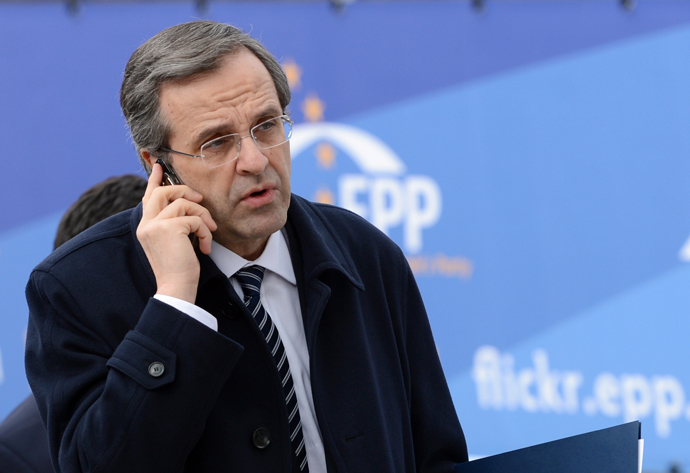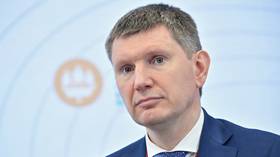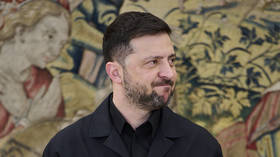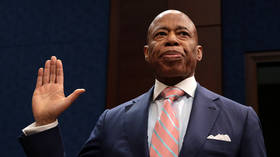'Greece must reduce unemployment or face violent extremism'
After four years of austerity Greece has won the battle to stay in the eurozone and now must focus on attracting investment and reducing unemployment if it is to avoid extremism Simos Kedikoglou, a Greek government spokesman, told RT.
RT:2012 was a momentous year for Greece and for the Eurozone, the country managed to keep the euro and fears of the country’s immediate bankruptcy have receded, is Greece over the worst?
Simos Kedikoglou: Greece is over the worst of it. But it’s not over yet. We still have things to do. Our first battle for our government was in June and the climate was very, very negative. I would say that we were practically out of the Eurozone, but we managed to win the first battle, the battle for the Eurozone. Now is the second battle, the battle against unemployment. Because unemployment in Greece has risen to levels nobody can imagine. 27% among all the population, 60% among young people, because in the beginning it was only austerity, austerity and nothing else. That didn’t work, that is why we have the fourth year of recession, that’s why unemployment rose to those levels. Now the new program has policies for development and these tools we are using them to create jobs. In any case, the Greek economy desperately needs new clean money. By clean money I mean not loans. And this can be achieved in two ways mainly: by exports and by attracting investment. In both these ways, Russia is an ideal partner and that’s the reason that here in Russia, we presented for the first time the new investment law in Greece.
RT:Please tell us a little bit about that
SK: I’ll tell you two things that are quite significant. On the high level, by high level I mean big investments, we have a fast track procedure, which means that practically whoever invests more than 50 million euros in Greece; we will take the investor by the hand and guide him until the fulfillment of their investment. We have made certain procedures, for example all necessary permission will be by one service, they won’t have to go through this marathon labyrinth of service to service to get permission.
RT:It’s an easier procedure?
SK: It’s an easier procedure, we’re battling bureaucracy, and we’re simplifying things. Something else, on the lower level, something I believe will be an attractive idea to many Russians. Any Russian that buys a house in Greece above a certain level that will be about 200,000 euros, he and his family will have a five year visa, which will be renewed if he keeps the house.
RT:Well, as I can see Greece is moving towards closer, stronger relations with Russia, but not everybody is happy, we know that Greece is expected to raise 50 billion euros in privatization among other things, selling natural gas assets, and there are media reports suggesting the US and European authorities have said not to sell it to…
SK: We are going to carry on the procedure as it has been planned, the best offer wins and we welcome the Russian proposals, there are two Russian companies that have entered the procedure, as far as I know, they have very good proposals, its two main factors are important, the sum of money that is offered but also the gas plan, because you can understand and especially for an economy, which wants to get out of a crisis, we want the cheapest possible energy for the next 5-10 years.
RT:But did your government receive any advice from western authorities?

SK: No, the only advice came from articles in the newspapers, I’m also a journalist and I know how some articles appear.
RT:It’s just media speculation then?
SK: The best man wins. The best offer in our case.
RT:OK, so as far as I understand, that all sounds like no more austerity for Greece, is that correct?
SK: Greeks have suffered very much. The average income of a Greek has fallen by 30%. How much more austerity? We need development; we are desperate for air, for oxygen, because we were in a downward spiral. We managed to stop it and by the summer we will have started to rise again. And this year will be the first year after many, many years that Greece will have a primary surplus and I believe that it’s something like 30 years that we haven’t achieved that. So we are doing things right. It’s hard. And we must help as soon as possible those categories for example low pensions that need help.
RT:Even at a time when the Eurozone was created back at the end of the 1990’s, Helmut Kohl, the then German Chancellor ignored signs, and the fact that experts have been saying that and pointed that out to him, that Italy was not ready to join the euro. He was very well informed, and very well aware of the fact of special risks, that this country and this accession may pose to the euro and two years later the same happened with Greece. It was accepted but it wasn’t actually ready as experts were saying. Why at that time, countries like Italy, like Greece, were so forcefully dragged in do you think?
SK: Well, it was the European dream. There you also have to look for other responsibilities. Why did we invest in the monetary union without advancing the economic political union? How was that possible? How did we do such a mistake? I’m telling you responsibility goes right back to Brussels. And to the whole of the European Union. And right now the European Union is facing a major challenge, it must change, it must be taught by the mistakes of the past. And we want to be optimistic , we believe that Europe will change in the correct direction.
RT:But mistakes were made, your absolutely right, but will anybody….?
SK: But will we stop making them, well you have to ask quite a few politicians about that.
RT:But will anybody ever hold any responsibility for those mistakes? Because the consequences are very tough and ordinary people are suffering, they don’t deserve that….
SK: Consequences, what do you mean consequences? Consequences for somebody that made money out of this, yes there will be. Consequences for somebody that decided wrongly, poorly. What kind of consequences. I believe the biggest punishment for our politicians; especially a leader is what history writes. What other consequences, put them in prison? If we had advanced the political union, along with the monetary union, we wouldn’t have arrived at this point. If, before lending money, we were checking better, we wouldn’t have arrived at this point. If we had known we wouldn’t have done what happened. But with ‘if’s’ you don’t solve problems. What is most urgent for us is to make things better for the people.
RT:And still Greek society is united? How do you feel it? Is it better now?
SK: Of course, listen; it’s a very difficult period. It’s a period that…unemployment is the best ally for extremists, that’s why you see the rise of the neo-fascists, that’s why you see the rise of the political violence, that’s why you see from the extremists leftists carrying out acts of violence.
RT:Is it a long standing phenomenon?
SK: No it’s not a long standing phenomenon and I believe that as soon as we manage to battle unemployment, we will see political violence slowing down, and you will see the rise of the neo-fascists ending. It is understandable. Desperation is the worst councillor, so we must bring back hope.
RT:People are striking in Greece from time to time and your government has at least twice already threatened to arrest striking workers and some say that…
SK: We don’t arrest striking workers.
RT:No, I said threatened to arrest.
SK: No, no. There is a procedure in the Greek legal system that on certain occasions allows the government to order people to work. For example, when you have a strike of well-paid people that earn salaries of over 3000 euros per month, when most Greeks are making ends meet with 1000 euros and less, they are striking and paralysing the whole city, a group of a few hundred people, so they won’t lose their privileges, then yes the government must force them to work and that’s what we did. We didn’t arrest anybody, we didn’t threaten anybody. We enforced the law. Nobody can keep a society hostage, that’s what we said and that’s what we did.
RT:I can hear, I can feel that your talking with huge respect about European partners, but here is criticism coming from some German politicians, some German media, in relation to modern Greece. Is Greece now happy to live in this kind of common European home?
SK: Let’s see what kind of common European home we make, because I’m telling you Europe has to change, let’s see the direction.
RT:But right now you are happy with…
SK: listen, our partners expressed their solidarity last November. We were offered help on conditions that are the best in Europe and possibly the best in the world. Finally they showed their solidarity. Now we must do our job and we believe that this year, by the end of this year we will be on the rise and everybody will know that we are on the right track.
The statements, views and opinions expressed in this column are solely those of the author and do not necessarily represent those of RT.












